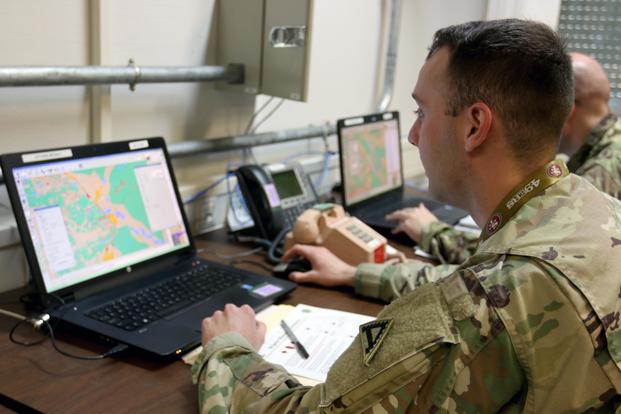FORT IRWIN, California -- Army combat units rotating through the National Training Center will soon face swarms of drones and long-range communications challenges if the combat training center expands by 80,000 acres.
NTC is one of the Army's three combat training centers that put brigade combat teams through realistic, decisive-action training rotations designed to prepare them to face near-peer threats such as Russia or China on a modern battlefield.
In addition to fighting an armored opposing force (OPFOR), BCTs will soon have to face a greater drone presence here.
"We are going to test out drone swarms -- so 40 drones by one operator flying overhead dropping grenades," Col. Carl Michaud, deputy commander of NTC, recently told Military.com.
Related content:
- NTC in Pictures: A Look at an Army Brigade's Decisive Action Rotation
- Here's the Real Story Behind the 'Painted Rocks' at Army's NTC
- Headed to the Army's National Training Center? Here's What You Need to Know
- Army's National Training Center Poses Amped-Up Challenge for Reserve Units
- At National Training Center, Soldiers Now Train for What They Dread: A Fair Fight
Drone swarm technology that involves a single operator is fairly new, he said.
"You see it like in Super Bowls and stuff like that, but that is all computer controlled and there are towers and they are all pinging it off of it," Michaud said. "This is no-kidding autonomous with one pilot."
The Army's Training and Doctrine Command is overseeing the effort, and "we are implementing it for the Army," he said, adding that he hopes to have the first drone swarms go up in the current rotation.
NTC officials also hope to upgrade the center's internal cell-phone network to give insurgent role-players better communications capability.
"We run our own cell phone network out here. It's right now a 2G 900 megahertz, and we are getting ready to upgrade that to a 4G LTE," Michaud said. "It will create more realistic problems. ... So now, if I am an insurgent and I am in [the fictional town of] Razish, I can take a picture and text it back to the OPFOR commander, who is my buddy or who is my brother's friend in the scenario, and he can get real-time footage."
NTC officials hope to have the project completed by December, he said.
In the long term, NTC will likely expand its 1,000-square-mile training area by 80,000 acres, Michaud said.
"The western training area is what we are calling it," he said. "We hope by 2025 this will be fully ready for training."
The expansion is more about providing units with realistic, long-range communications challenges than it is about increased maneuver space, Michaud said.
"The corps support battalion and the aviation task force would base out of this space, so now they are geographically separated [from the BCT] and you have to use higher levels of strategic communications ... you can't just use FM," he said. "We want to use that to stretch out the lines of communication and make it more realistic in terms of distances."
-- Matthew Cox can be reached at matthew.cox@military.com.













